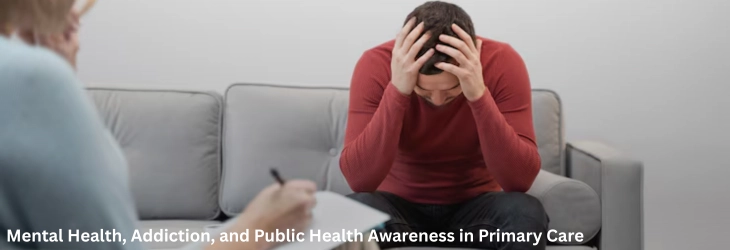Track: Mental Health, Addiction, and Public Health Awareness in Primary Care

Mental health and substance use disorders are among the leading causes of disability worldwide and are increasingly recognized as critical areas within primary healthcare systems. This session, titled “Mental Health, Addiction, and Public Health Awareness in Primary Care,” will explore how primary care providers play a frontline role in addressing mental wellness, managing addiction, and promoting awareness across communities.
Primary care is often the first and most frequent point of contact for individuals facing psychological distress, substance misuse, or co-occurring disorders. As such, it serves as a vital entry point for screening, early intervention, integrated treatment, and referral. This session will emphasize the importance of building responsive, stigma-free environments where mental health and addiction care are seamlessly embedded into routine primary health services.
Through this session, experts, practitioners, and researchers will examine innovative care models that improve access and outcomes for individuals facing mental health challenges or substance use disorders. Additionally, it will highlight the role of public health education and community outreach in shaping healthier behaviors, increasing mental health literacy, and reducing stigma.
Key Topics:
Integrating Mental Health into Primary Care Settings: Practical models for embedding mental health assessment, counseling, and care coordination into general medical practices.
Early Identification and Intervention Strategies: Techniques and tools for the early detection of mental health disorders and substance use, including brief intervention frameworks and screening tools like PHQ-9 and AUDIT-C.
Substance Use Disorders and Addiction Care in Primary Care: Addressing alcohol, drug, and prescription medication misuse. Best practices for patient engagement, relapse prevention, and medication-assisted treatment (MAT).
Addressing Depression, Anxiety, and Trauma in Community Clinics: Approaches for managing common mental disorders in low-resource and high-volume primary care environments.
Mental Health Literacy and Public Awareness Campaigns: Strategies for empowering patients and communities through education, de-stigmatization, and informed decision-making about mental health and addiction.
Crisis Intervention and Suicide Prevention at the Primary Level: Training and protocols for primary care teams to respond to acute mental health crises, suicidal ideation, and self-harm risk.
Youth Mental Health and Addiction: Tailored strategies to support adolescents and young adults facing rising rates of anxiety, depression, and substance use.
Tele-mental Health and Digital Tools: The use of telehealth, mobile apps, and virtual care platforms to expand mental health and addiction services, particularly in remote or underserved regions.
This session provides a multidisciplinary platform for general practitioners, nurses, behavioral health specialists, social workers, researchers, and policymakers to exchange knowledge and experience. Participants will gain insights into integrated care delivery, scalable mental health solutions, and community engagement practices that support better public health outcomes.
Join us as we work together to build stronger, more compassionate primary care systems that prioritize mental health, addiction recovery, and public health awareness for all.
Scientific Highlights
- Public Healthcare and Management
- Role of Primary Care in COVID 19 Pandemic
- Emergency Medicine and Treatment Procedures
- Seasonal Allergies & Primary Care Treatments
- Maternal Health in Primary Care
- Mental Health, Addiction, and Public Health Awareness in Primary Care
- Global & Public Health Initiatives
- Primary Care Oncology
- Primary Care Cardiology
- Primary Care Urology
- Quality in Primary Care and Epidemiology
- Infectious Diseases and Public Health
- Surgical Care, Critical Care, and Emergency Nursing
- Primary Care Advancements in Diabetes and Obesity
- Pediatrics and Nurse Practitioners
- Geriatric Care in Public Health
- Primary Health Care and Family Medicine
- Orthopedic Primary Care
- Primary Care Dermatology
- Reproductive and Sexual Health
- Primary Care Ophthalmology
- Primary Care Dentistry
- Chronic Disease Management in Primary Care


